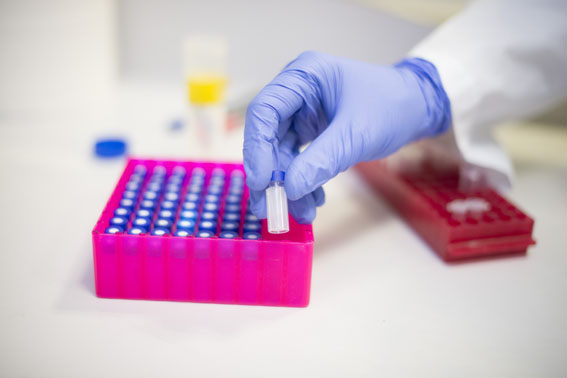The goal of 'Spark' is to carry out the first preclinical stages of the development of a first-in-class drug to prevent, stop and reverse the progression of cognitive deficits associated with schizophrenia and other mental disorders to start trial of the candidate drug in humans by 2016. The project, which just won a 500,000 euro endorsement from the Ministry of Economy and Finance through the Challenges-Collaboration subprogram- will be developed by a consortium led by the biotech Iproteos -located at the Parc Cientific de Barcelona- and comprised of IRB Barcelona, the Centre for Genomic Regulation, the University of the Basque Country and the company Ascil-Biopharm. Currently there is no drug that targets the cognitive deficits associated with schizophrenia, the third most disabling disease even above paraplegia and blindness- according to the WHO and that affects about 24 million people worldwide. It is also the fifth disease with a higher annual cost to society, and that in the European Union exceeds 35,000 million euros.
-

In memoriam: Arturo Muga
-

Violeta Pérez Manzano: «Nire ahotsa ijito bakar batengana iristen bada eta horrek inspiratzen badu, helburua bete dut»
-

In memoriam: German Gazteluiturri Fernández
-

Itsasoaren gainazalaren tenperatura-igoerak aldaketa sakonak eragin ditu makroalgen komunitateetan
-

Azukrea eta edulkoratzaileak. Zer jakin behar dut?
'Spark', a new public-private project created to develop a drug to fight the cognitive deficits of schizophrenia
- Research
First publication date: 28/01/2015

A public-private consortium led by the biotech Iproteos -based at Parc Científic de Barcelona (PCB)-, and comprised by the Institute for Biomedical Research (IRB Barcelona), the Centre for Genomic Regulation (CRG), the University of the Basque Country (UPV/EHU) and the biopharmaceutical company Ascil Biopharm, has launched a project to advance the development of a new neuroprotective drug for the treatment of the cognitive deficits associated with schizophrenia and other mental disorders. The project, called "Spark", just received a 500,000 euro grant from the Ministry of Economy and Finance, through the 2014 Challenges-Collaboration call as part of the National Programme for Research Aimed at the Challenges of Society' (File. RTC-2014-1645-1).
The drug candidate is IPR019 that belongs to a family of compounds of so-called 'third generation' developed and patented by Iproteos. The therapeutic activity of the drug is based on blocking a protein located in the brain and related to cognitive deficit. "Our drug acts through a yet unexplored novel mechanism of action in the treatment of schizophrenia, and is therefore a first-in-class drug", explains scientist Teresa Tarragó, CEO of Iproteos and researcher at IRB Barcelona.
IPR019 is a peptide derivative (small protein) able to cross the blood-brain barrier- a protective wall of the brain, impassable for most drugs available in the market- that has already shown its efficacy as cognitive enhancer in vivo tests. Scientists have achieved a significant improvement in learning and memory capabilities, which make it a revolutionary treatment for diseases of the central nervous system in which cognitive abilities are severely diminished.
Iproteos, the biotech coordinating the project, will assess the metabolism and toxicity of candidate compounds and their activity once administered orally and subcutaneously in animal models. The Peptides and Proteins Lab at IRB Barcelona -led by Ernest Giralt where Teresa Tarragó works as associate researcher- will be in charge of compound synthesis. The Proteomics Unit of the CRG-UPF -led by Eduard Sabidó- will carry out proteomics studies to assess the changes caused in the cells after they are treated with the compounds. Ascil Biopharm will be in charge of the drug product CMC development either for oral or injectable routes. Finally, the Neuropsychopharmacology Unit of the UPV/EHU -led by Javier Meana- will be responsible for confirming the activity of the formulations by means of in vivo studies in animal models of schizophrenia.
The expected end-result will be obtaining an optimal formulation and route of administration of the compound for use as a drug in patients. This will allow carrying out the regulatory preclinical trials and then the first administration of the drug candidate in humans in 2016 for future application in health centers.
Schizophrenia is the third most disabling disease- even above paraplegia and blindness- in the DALYS index (Disability-Adjusted Life Years) of the World Health Organization (WHO). It is estimated to affect about 24 million people worldwide, and is the fifth most costly disease for society in terms of required care and loss of productivity (up to 90% of patients are not working) with an annual cost in the European Union exceeding 35 billion euros.
"The treatment, developed by Iproteos, represent a major advance in the management of this disease. Currently, there are no drugs capable of correcting cognitive deficits in patients with schizophrenia, therefore an effective therapy will have a major impact on the quality of life of patients. Given its efficacy and innovative nature, there are already pharmaceutical companies who are interested in following the progress of the project", Teresa Tarragó says.
About the Neuropsychopharmacology Group of the UPV/EHU
The Neuropsychopharmacology Research Group at the UPV / EHU is an international leader in the study of the biological substrates of mental illnesses and the development of new and more effective treatments for these diseases. At present, the group focuses its activity on the study of factors that can trigger psychotic episodes and the mechanisms that generate cognitive impairment and deterioration in schizophrenia. The group usually works on postmortem brain samples from subjects with mental illnesses and in mental illness animal models. The Neuropsychopharmacology Research Group at the UPV / EHU is part of the CIBER consortium of Mental Health, which is linked to the Instituto de Salud Carlos III.


